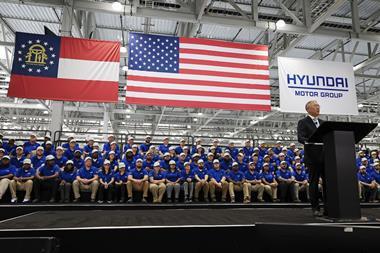Latest figures provided by the Spanish Association of Car and Truck Manufacturers (ANFAC) for vehicle movements through the country's national ports shows that 86% of all finished vehicles built locally are exported. Of the 2.4m vehicles produced last year – which was the best for the past five years, with production up 11% - more than 2m were sold abroad and, of these, 86% (1,749,147 units) were despatched by sea
Just five ports account for 92% of the total: Barcelona, Vigo, Valencia, Santander and Pasaia/Pasajes. Those ports have built dedicated installations to handle this type of traffic.
In 2014, 2.66m finished vehicles moved through Spanish ports, up 4.6% on 2013, when 2.54m were handled. Of that total, 65.6% were exported and 27% (720,059 units) imported. The remaining 194,706 units, or 7.4%, were transshipped.
Barcelona remains Spain's automotive hub port of choice, accounting for 753,276 units, with consignments despatched as far afield as Argentina, China, India and South Africa. It is also a major exporter of pieces and components, a business that is on the increase. In 2013, for example, 42,000 containers stuffed with automotive parts passed through the port, rising to 50,000 last year.
However, in the first quarter of the present year, automotive containers had risen by 45% compared to the first quarter of 2014, amounting to 15,000 units.
The majority of this growth at the port is because of a new rail service launched last summer, connecting box terminals with the inland port at Zaragoza (tmZ). Now, 100 containers a week are discharged at Barcelona inbound from South Korea to tmZ, where they are transshipped to road for delivery to the Opel plant at Figueruelas.
Rail is used extensively by Barcelona port to move finished vehicles, even short distances. For example, the Autometro service, operated by FGC, links the Seat plant at Martorell with the port's car terminals three times daily, accounting for 100,000 finished vehicles annually. In addition, there are daily connections further afield to Pamplona and to both Valladolid and Palencia, while a weekly service is also provided to Ávila. Furthermore, there are regular inbound trains from Figueruelas, Madrid and Vigo, all conveying finished vehicles.
In the first quarter of this year, a new rail connection began between Barcelona port and Marklosheim, in France, making use of the relatively new standard gauge connection between the two countries. This service carries vehicles built in northern Spain bound for either the Spanish or Algerian markets. Four trains arrive weekly, with trailing loads of 300 metres, returning with cars built in Figueruelas.
Behind the port of Barcelona, in second place, are the ports of Valencia and Sagunto, both of which are administered by Valencia Port Authority. They handled a combined 492,279 vehicles in 2014.
Vigo is the leading Spanish Atlantic port, registering throughput of 421,502 units last year. Santander is in second place, with 377,454 vehicles, followed by Pasaia/Pasajes with 222,568 units.
Spain, which has 13 automotive manufacturing plants, is now the world's ninth largest finished vehicles manufacturer, worth an estimated €16 billion ($17.4 billion) annually to Spain's balance of payments, whilst being responsible for around 93,000 direct jobs.

























![Global[1]](https://d3n5uof8vony13.cloudfront.net/Pictures/web/a/d/s/global1_726550.svgz)











